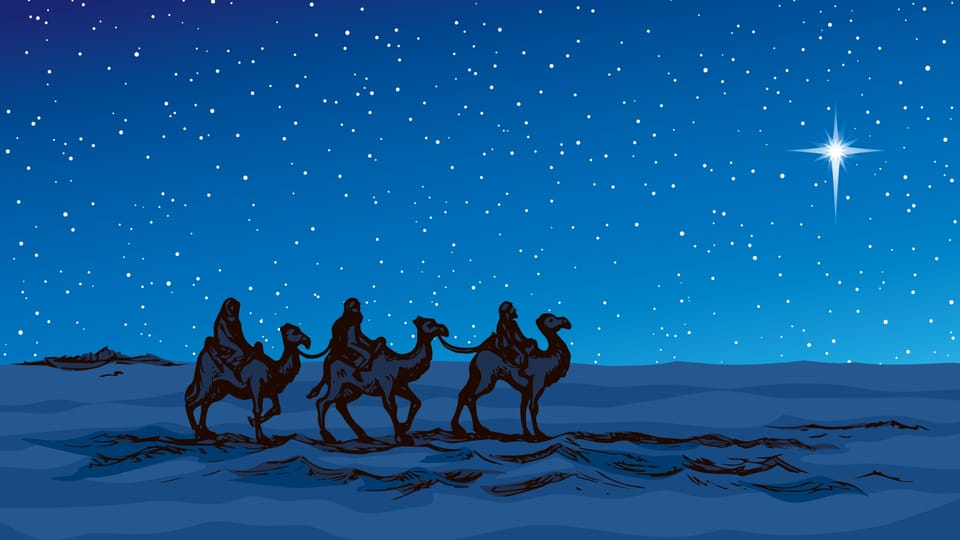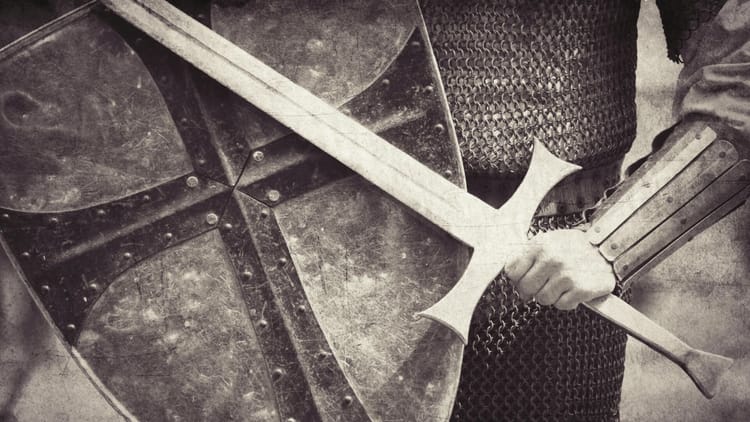Follow the True Star of Christmas (Matthew 2:1-12)

Big Idea: Respond to Jesus with worship, not hostility or indifference.
This morning I want to take you on a journey with me, back two thousand years ago. I want to share the story of two kingdoms that still exist and compete for our interests today.
But first, I have to set the scene.
The Scene
When
It's a familiar story, but somewhat clouded by years of tradition. This story didn't happen in a manger or when Jesus was a newborn. There were no chance encounters between shepherds and the characters in this narrative, as the events unfolded during a time when Jesus had likely just begun to crawl or may have even taken his first steps. For it took place, not the night of Jesus' birth, but within the first two years of Jesus' birth.
Where
And it took place not in a manger, but according to Matthew 2:11 in a house. Mary and Joseph, and their child Jesus, lived in a house in a small, nondescript town called Bethlehem. It was nothing more than a small village. Important events occurred in Bethlehem: Jacob buried Rachel there, and Ruth met and married Boaz. And it was here that David, the great king of Israel, grew up and tended sheep. But it was only a small village, five or six miles south of Jerusalem, cradled between two ridges.
Those of you with young children can imagine that life for Mary and Joseph had begun to return to normal. Gone were the shepherds, although as they left they had broadcast the news of Jesus' birth to everyone in the area. But in that small, insignificant town, life began to return to normal. They had found a house in Bethlehem in which to live. Jesus was growing, able to do new things all the time. As new parents, Mary and Joseph would sit there amazed at how their little baby was developing. For reasons unknown to us, they hadn't yet returned to their hometown of Nazareth. But life was beginning to return to normal for Mary, Joseph, and their growing infant Jesus.
Who
But let me introduce you to three sets of characters that make up today's story.
The first character, and probably the most colorful, is introduced in Matthew 2:1 as King Herod. This is the first of several Herods mentioned in the New Testament. To be honest, I had always pictured a male equivalent to Queen Elizabeth – sort of a regal, distinguished gentleman. To be sure, Herod the Great had his good points. He constructed theaters and racetracks. He transformed and enhanced key cities, adding remarkable features to elevate their significance. During the great famine of 25 BCE, he melted down various gold objects in the palace to buy food for the poor. He was a capable and clever warrior, orator, and diplomat. He even began the reconstruction of the Temple in Jerusalem. So Herod did have his good points.
But Herod the Great was also a despot, a megalomaniac. He could be cruel and merciless. He was incredibly jealous, suspicious, and afraid for his own position and power. Herod took competition seriously. He appointed a man named Aristobulus – his brother-in-law – to be high priest in Jerusalem. When Aristobulus became too popular, Herod had his servants drown him in a pool, making it appear as an accident. Some accident, because later he had his wife killed, and then his mother-in-law killed. Just before Jesus' birth, he had two of his sons killed, and after Jesus was born, he had a third son executed.
One of the greatest indications of his bloodthirstiness and insanity took place shortly after Jesus was born. Herod knew that he was going to die. And so he ordered all the notable Jews from all parts of the nation to come to him. When they arrived, he locked them in the hippodrome. Aware of his unpopularity, he commanded his sister and her husband to kill all the leaders in the hippodrome at the time of his death, aiming for national mourning instead of a celebration. Herod was a tyrant and a megalomaniac who quickly eliminated his rivals, including family members, who posed a threat to him. That's the first character introduced to us in verse 1.
The second set of characters introduced to us is mentioned in verse 1 – the Magi. Right away, banish all ideas you may have of three kings of Orient. We know little of these men – we don't even know how many there were. We don't know where they were from, except from the East – probably Persia, Arabia, or Babylon. They weren't kings; they were astrologers or magicians. They were uncircumcised, idol-worshipping, heathen, Babylonian, magician-astrologers. They were skilled in astrology and astronomy, practiced sorcery, and were known for their dream interpretation abilities. Magi had grown to be important and powerful advisors in the Babylonian empire. Due to the presence of many Jews in their area, they were likely familiar with the Jewish texts known as the Old Testament.
Guided by a star, the magi, who practiced idol worship, came to Jerusalem asking, "Where is the King of the Jews who has been born?" Somehow, they had studied and determined that a King had been born in Israel. Perhaps they had even read the prophecy of Balaam in Numbers 24:17: "A star will come out of Jacob; a scepter will rise out of Israel." Imagine these magi. Being powerful men from the east, they likely arrived with many soldiers and servants. They had the look of prestige, wealth, and power. Imagine a group of foreigners surrounded by soldiers and servants in the streets of Jerusalem, asking, "Where is the newborn King of the Jews?" Imagine their surprise that nobody in Jerusalem seemed to know about this special baby's whereabouts. But they wander around Jerusalem making inquiries, "Where is he who is born King of the Jews?"
Imagine Herod, a figure steeped in historical intrigue and controversy. Cruel Herod, ready to execute anyone who is a threat to his kingdom. At this point, he is some seventy years old, but not willing at all to entertain competition for his job as king of the Jews. Read verse 3: "When King Herod heard this, he was disturbed, and all Jerusalem with him."
When the Bible says that King Herod was disturbed, I think you know what that could mean. People were reluctant to disturb the already paranoid Herod. They understood that Herod's agitation frequently signaled impending bloodshed. And Herod didn't stop to think through carefully who his enemies might be. Many innocent people could lose their lives. It's no surprise that when Herod was troubled, all of Jerusalem shared in that turmoil. No doubt there was going to be some rebellion, bloodshed, and suffering.
But there's a third set of characters introduced in verse 4: the chief priests and teachers of the law. The chief priests were a group of leading priests, including the current and previous chief priests. At that time, this group was nothing more than a bunch of corrupt, religiously oriented politicians. They had both political and religious power. Matthew also mentions scribes and teachers of the law. These were experts in the Old Testament and its oral tradition. This was a group of people that likely didn't get along very well with the chief priests. But Herod asks these two groups where the Messiah was to be born. And they respond, "In Bethlehem."
You know how the story develops. Verse 7 tells us that Herod met secretly with the magi, asking them when the star had appeared. Herod was plotting to kill all male babies of a certain age in Bethlehem and needed to determine what age to target. Herod would stop at nothing to eliminate potential threats to his rule. This behavior was completely typical of Herod. And he sent the magi on their way, asking only that they return and tell him where to find the child, so, he says, he can go and worship too. They leave, they find Jesus in the house in Bethlehem, and they worship Jesus Christ, the King of the Jews.
So use your imagination this morning. Go back two thousand years. Imagine Mary and Joseph opening their front door to find foreign Babylonian astrologers, along with soldiers and servants, standing there. These men shocked everyone by bringing valuable gifts to Jesus, who was about a year old. Herod, paranoid and delusional, is just five or six miles away, waiting for more information to begin his plan of violence. Just waiting for an opportunity to kill anyone who threatens his reign – even a little child.
Our Place in the Story
Because this story is completely factual. And I see myself reflected in it. I see you reflected in it as well.
This passage shows three basic responses people had to Jesus, even as a baby. These are the same responses men and women have given throughout history, just like you are today.
Hostility
Some, like Herod, are hostile to him. Just as Jesus was a threat to Herod, so Jesus and his kingship are a threat to many people. Some responded in Jesus' day with intense hatred for him. They were threatened by his rule. They wanted nothing to do with him. And even from the time that he was a baby, people wanted to kill him. Eventually they did. Jesus said as an adult, at a time when even his own brothers didn't believe in him: "The world…hates me because I testify that what it does is evil" (John 7:7).
Make no mistake about it: hatred is not too strong a word for what some people feel about Jesus. They wish he had never been born. Matthew 2:16 states that Herod was enraged when he realized the magi had deceived him by not revealing Jesus’ location. The word for "enraged" is a strong word. We read that Herod lost control of his passion and became completely controlled by it. He knew that the child he was wanting to destroy was the Messiah. He arrogantly tried to kill God's very anointed one.
You might not have the same paranoid and insane hatred of Jesus that Herod did, but be honest. Do you hate him? Are you threatened by his rule? Are you trying to do everything in your power to thwart his purposes in your life, to end his kingship? Do you hate Jesus like Herod did?
Herod the Great left his marble palaces and millions of tons of huge stones. Jesus, the King of the Jews, left "living stones," spread around the world. Today, Herod's kingdom lies broken and scattered beneath the sea and earth. Jesus' kingdom, on the other hand, will stand forever.
Indifference
Some, like the chief priests and scribes, didn't hate Jesus, but were indifferent to him. The priests knew Scripture, and they pointed others to the Savior, but they wouldn't go themselves. They understood that God's Word referred to a real Messiah, a historical figure born in Bethlehem, who would rule Israel. They quoted Micah 5:2 but didn't obey it. They were five miles from the very Son of God, and yet they didn't go to see him! They were indifferent to Jesus.
Throughout history, there have been people who are indifferent to God. Some, like Herod, are immediately hateful, wanting only to destroy Jesus. Others, like the chief priests and the scribes, pay little attention to God and his way. What they do know, they don't accept or obey. At most, he is given lip service. Indifferent people often end up against God. As someone's said, "Indifference to God is simply hatred that is concealed and rejection that is delayed."
It's easy to be indifferent to Christ, even at Christmas. One can know all the Gospel accounts of Christmas and still celebrate it as if it's only about Santa, the Nutcracker, Jimmy Stewart, and gifts. Every year we're tempted to capitulate to the trivial pursuits of Christmas: gift-giving; entertaining; over-committing; overspending. And we end up becoming indifferent to the true star of Christmas, Jesus Christ.
It's one thing to be able to know what Christmas is all about. It's something altogether different to follow him in our lives – our choices, our priorities, direction, and purpose. If you're indifferent to Christ, maybe you need to get down on your knees and confess that you've been keeping Jesus at arm's length. He's only a short distance away, and yet you haven't gone to worship him. You haven't let him unsettle your personal goals and routines. You haven't yet experienced his resurrection power. This Christmas, consider taking specific actions to avoid being indifferent, like the chief priests and scribes.
Worship
But there's a third response. Some, like Herod, are hostile to him; some, like the chief priests and scribes, are indifferent to him. Some, like the magi, worship him.
On coming to the house, they saw the child with his mother Mary, and they bowed down and worshiped him. Then they opened their treasures and presented him with gifts of gold, frankincense, and myrrh. (Matthew 2:11)
The magi offered Jesus expensive and uncommon presents, and fell down and worshiped him. These uncircumcised, idol-worshipping Babylonian astrologers, unfamiliar with the Scriptures, were honored to pay homage to the King of kings. Our modern culture has turned the Christmas spotlight on holiday heroes like Santa, Martha Stewart, and the local Christmas shop. We've deified the pursuits of gift-giving, entertaining, and decorating. While there's nothing wrong with these in themselves, they're not what Christmas is about. To make this season meaningful, we must not be hostile to Christ, or indifferent to him. We must focus on and worship the true star of Christmas – Jesus Christ, God with us.
Max Lucado writes, "Those who missed His Majesty's arrival that night missed it not because of evil acts or malice; no, they missed it because they simply weren't looking. Little has changed in the last two thousand years, has it?"
As we celebrate His Majesty's arrival at Christmas, our Lord, may we not miss it because we weren't looking. We pray that we wouldn't miss it out of hostility or even indifference. But may we, like the magi, celebrate the birth of a king, and worship him, bringing him precious gifts. In Jesus' name, Amen.





